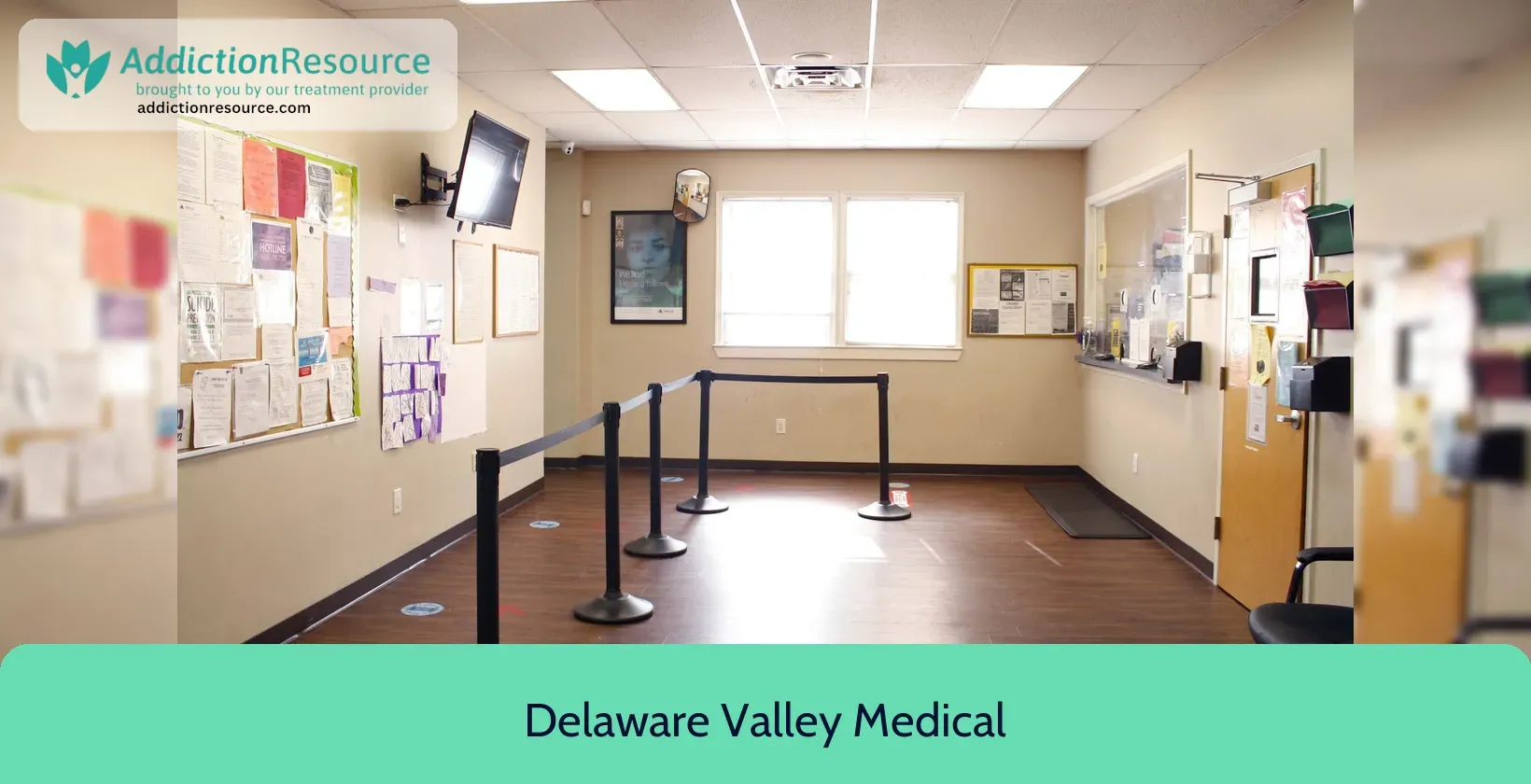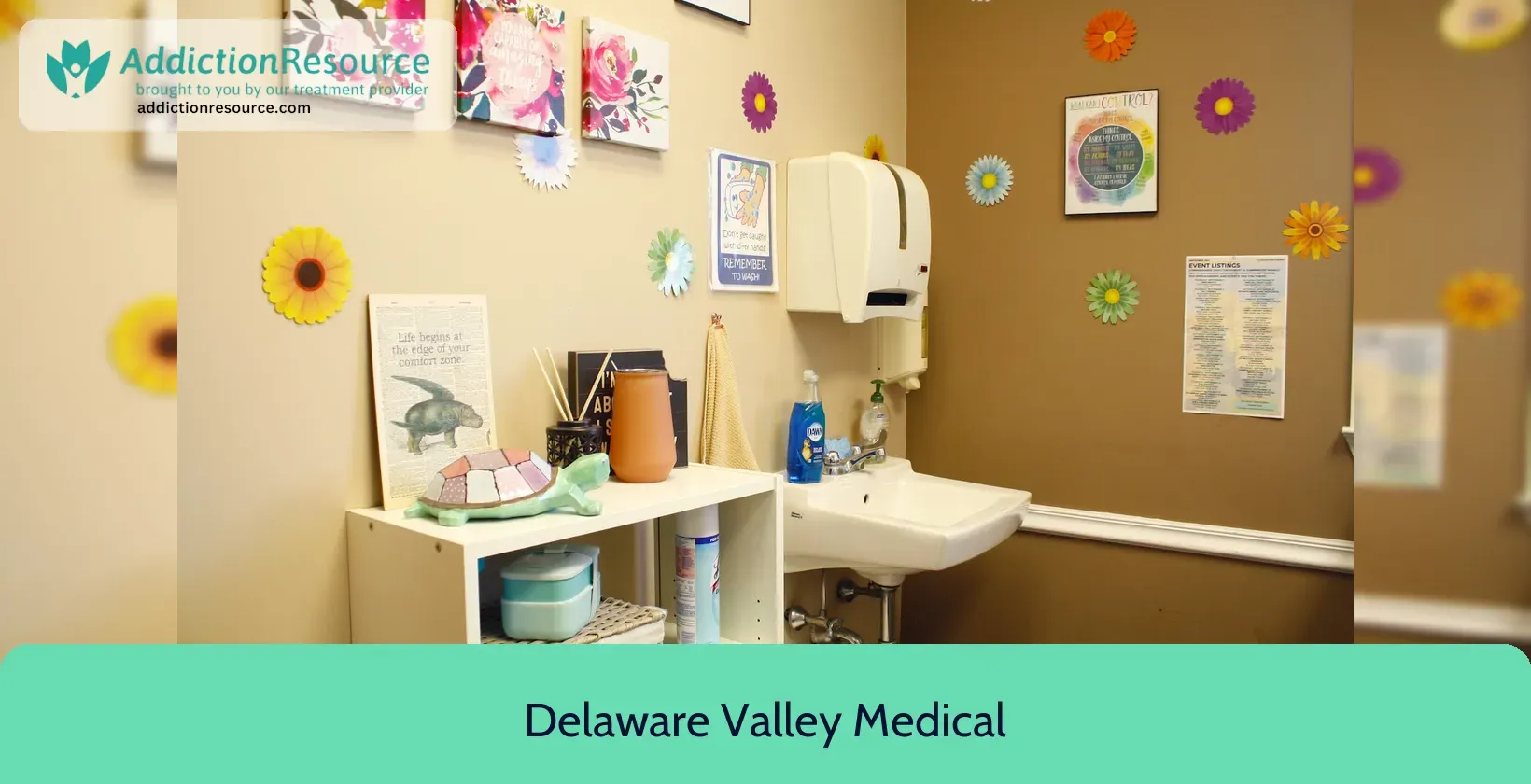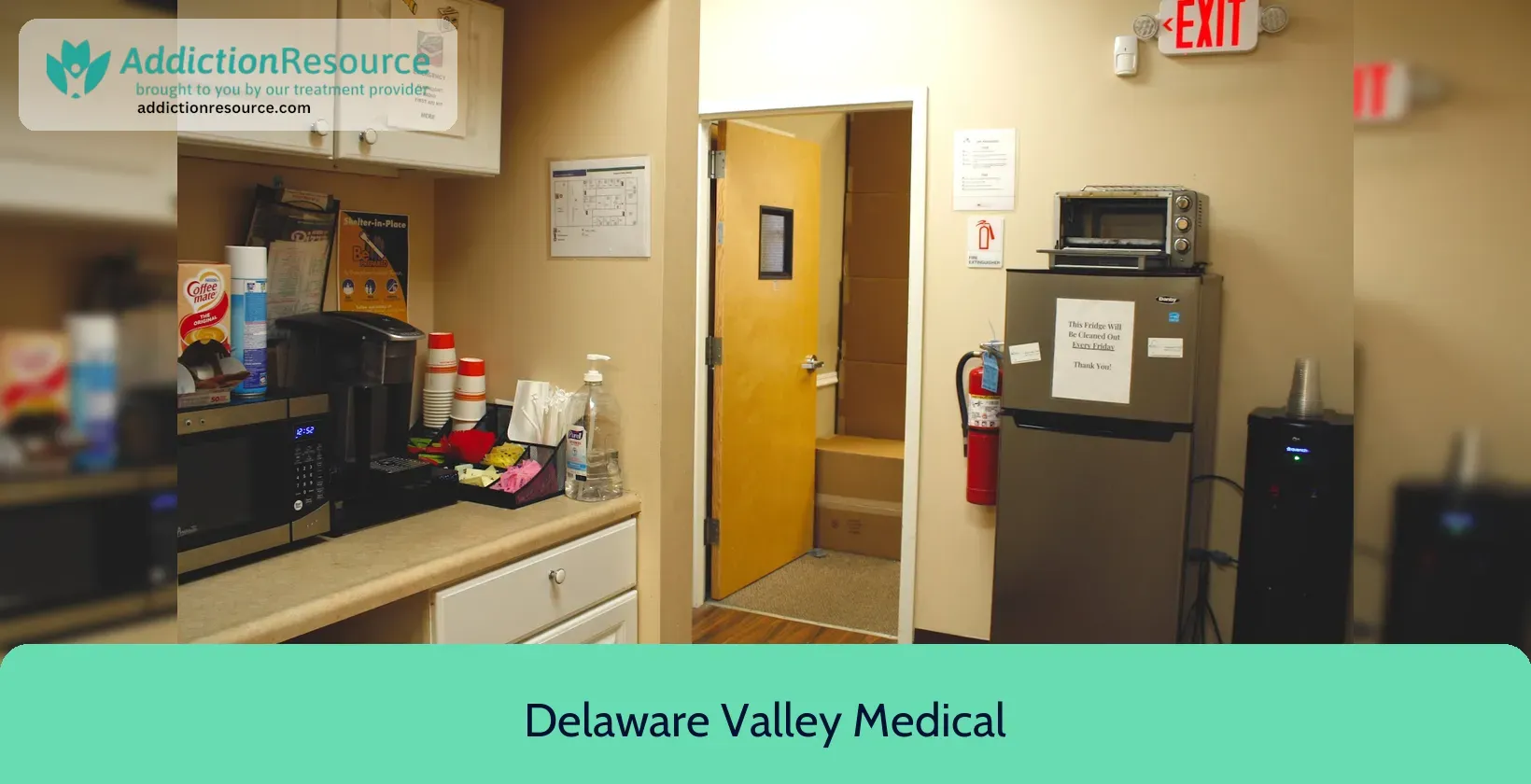Delaware Valley Medical – Merchantville, New Jersey in Merchantville Overview
Hope Without Commitment
Find the best treatment options. Call our free and confidential helpline
Most private insurances accepted
Treatment Options
The facility offers multiple levels of care, such as:
- Mentoring/peer support
- Housing services
- Discharge Planning
- Employment counseling or training
- Naloxone and overdose education
- Outcome follow-up after discharge
The center treats the following addictions and co-occurring disorders:
- Pregnant/postpartum women
- Clients who have experienced trauma
- Screening for tobacco use
- Comprehensive substance use assessment
- Outreach to persons in the community
- Screening for substance use
Treatment Modalities
Cognitive Behavioral Therapy (CBT) is a widely practiced form of psychotherapy that seeks to address dysfunctional emotions, behaviors, and thoughts through a goal-oriented, systematic process. It encourages individuals to challenge distorted cognitions and change destructive patterns of behavior by promoting self-awareness and effective coping strategies. CBT is often used to treat a range of disorders including anxiety, depression, and stress, making it a versatile and practical therapeutic approach. Through enhancing an individual’s capacity to manage life’s challenges, CBT contributes to improved mental well-being and overall quality of life.
Telehealth Therapy is a remote care option that allows individuals to access mental health services via digital technology, such as secure video conferencing. This mode enables patients to engage with therapists from their homes, offering flexibility and overcoming geographical limitations. Ideal for those in rural areas, with mobility issues, or tight schedules, Telehealth Therapy ensures quality mental health support is always within reach.
Substance use disorder counseling treatment modalities refer to various approaches and methods used in the counseling and treatment of individuals with substance use problems. This can include individual therapy, group therapy, cognitive behavioral therapy, motivational interviewing, family therapy, and 12-step programs. The goal is to help the individual overcome their substance use, develop healthy coping skills, and lead a fulfilling life in recovery.
Trauma therapy delves into past traumatic events that might be influencing a client’s current life experiences. Often, trauma serves as a significant precipitant or underlying cause of addiction. Such traumas can arise from childhood sexual abuse, domestic violence, growing up with a mentally ill parent, early parental loss, and experiences of sexual assault in teen or adult years, among other circumstances. Trauma therapy aims to aid the individual in processing and navigating beyond these traumas, guided by the expertise and empathy of skilled mental health specialists.
Group Therapy is a therapeutic space where individuals battling addiction come together to share experiences, gain insights, and support one another on their journey to recovery. Facilitated by trained professionals, this setting fosters communal healing and empowers participants to overcome the challenges of addiction through collective strength and understanding.
Family Counseling is a therapeutic approach that seeks to address and resolve conflicts, improve communication, and strengthen relationships within the family unit. By providing a safe space for family members to express their feelings and concerns, a trained counselor facilitates understanding and collaboration among members, promoting healthier dynamics and enhancing overall family well-being.
Marital/couples counseling treatment modalities refer to various therapeutic approaches used to help couples resolve conflicts, improve communication, and strengthen their relationship. These modalities can include cognitive-behavioral therapy, emotionally focused therapy, solution-focused therapy, and integrative approaches. The goal of these treatments is to help couples identify and address underlying issues and develop healthy relationship dynamics.
Recovery frameworks grounded in 12-step programs prioritize peer mentoring and underline personal development as essential for maintaining sobriety. Those in recovery are encouraged to attend 12-step meetings, which guarantee anonymity frequently, have no cost, and are accessible every day. These 12 steps draw from spiritual tenets, assisting participants in confronting the underlying reasons for their addiction, acknowledging their decisions, and embracing the aspects outside their control. Chosen by the participants themselves, sponsors offer individualized guidance and support.
Intervention is a set of structured processes or strategies designed to assist individuals in recognizing and addressing problematic behaviors, such as substance abuse, addiction, or mental health issues. These services typically involve a team of professionals or trained individuals who work collaboratively to guide and support the person in need and their loved ones, aiming to facilitate a pathway to recovery or appropriate treatment.
Contingency management and motivational incentives are evidence-based treatment modalities used in addiction and behavioral health programs. Contingency management involves the use of rewards to reinforce positive behaviors and change negative behaviors, while motivational incentives provide incentives to engage in treatment and sustain recovery. Both approaches are designed to increase motivation and engagement in treatment and have been shown to be effective in promoting positive outcomes.
Motivational Interviewing (MI) in addiction treatment is a client-centered counseling style aimed at promoting behavior change by helping clients explore and resolve ambivalence. Through empathetic engagement and evoking change talk, MI empowers individuals to harness their own motivation to overcome addiction, leading to a self-directed path to recovery. This approach respects individual autonomy while supporting positive change in a compassionate, non-confrontational manner.
“Anger Management” refers to a set of techniques and strategies designed to help individuals recognize and control their anger effectively. By understanding the triggers and responses to anger, individuals can learn to express themselves calmly and non-confrontational. Proper anger management prevents potential conflicts, ensures better interpersonal relationships, and promotes mental well-being and overall health.
The Matrix Model is a well-organized, multifaceted behavioral treatment approach that incorporates evidence-supported techniques such as relapse prevention, family therapy, group therapy, psycho-education, and self-help. These components are systematically and clinically coordinated to provide a comprehensive treatment experience.
Community Reinforcement + Vouchers is an evidence-based intervention strategy designed to treat substance use disorders. It combines behavioral therapy with a voucher-based system that rewards individuals for substance-free urine tests. This approach encourages individuals to reduce or abstain from drug use by emphasizing positive reinforcement, skill-building, and tangible incentives, fostering healthier life choices and improved community relations.
The Relapse Prevention Model plays a pivotal role in the treatment of alcoholism. Utilizing a blend of Cognitive Behavioral Therapy (CBT), this model is particularly valuable for individuals who have experienced multiple relapses. Through this approach, those in recovery are equipped with essential coping skills, empowered for their journey, and guided in adopting healthier habits.
In individual therapy, a person engages in a one-on-one session with a qualified therapist or counselor. This therapeutic approach is crucial in successful substance abuse treatment because it delves into the underlying causes of addiction, addressing issues the individual may encounter in their familial, social, and professional or academic environments.
Conditions Treated
Alcoholism
Alcohol addiction is a condition where someone feels a strong and uncontrollable urge to drink alcohol, often leading to negative effects on their health, relationships, and daily life. To assist individuals grappling with alcohol addiction, various strategies exist. Initially, supervised detoxification may be necessary to ensure a safe cessation of alcohol consumption. Following this, counseling and therapy play a crucial role in addressing the psychological facets of the addiction. Engaging in support groups can also offer a sense of camaraderie and comprehension.
Substance use treatment
Substance use rehabilitation represents a holistic treatment strategy tailored to aid individuals grappling with drug or alcohol addiction. This comprehensive rehabilitation method encompasses two key aspects: first, addressing the physical dependency, often commencing with detoxification, and second, tackling the psychological triggers through a range of therapeutic techniques. The ultimate aim is to empower individuals to attain and sustain sobriety while providing them with the necessary skills and coping mechanisms to successfully reintegrate into society and lead a life free from substance abuse.
Levels Of Care
Outpatient
Outpatient programs are designed for individuals in stable medical condition with a low risk of relapse, often those who’ve completed inpatient treatment. These programs extend the foundation of prior treatment approaches, offering continuous addiction guidance and resources for sustained recovery. For those transitioning straight from detox, medical and psychological assessments are typically conducted, leading to the development of individualized treatment strategies. The majority of outpatient rehab centers provide diverse care levels, customized to each client’s unique requirements.
Outpatient methadone/buprenorphine or naltrexone treatment
Naltrexone, an FDA-sanctioned medication, is employed to address both opioid and alcohol dependencies. It aids in curbing cravings and warding off relapses, facilitating a smoother recovery process. It’s available as a daily pill (brands include ReVia and Depade) or as a monthly injection (brand name Vivitrol). Prior to commencing naltrexone, patients should be free of any illicit opioids or opioid medicines for a duration of 7-10 days, including methadone.
Intensive outpatient treatment
IOP, or Intensive Outpatient, is a structured level of care for addiction, mental health, or other conditions. Unlike inpatient care, it allows individuals live at home and maintain daily responsibilities. They attend multiple weekly sessions totaling 9-20 hours, including individual and group therapy, family counseling, and skill-building classes for symptom management and relapse prevention.
Regular outpatient treatment
Traditional outpatient therapy typically involves attending one or two weekly sessions over the course of up to a year. These sessions are less frequent compared to other therapies, as outpatient therapy is designed for longer-term treatment. During these sessions, participants engage in group therapy or individual counseling, with a primary focus on identifying personal triggers and acquiring effective coping strategies.
Aftercare
Aftercare refers to the structured support and programs offered to individuals after completing an initial treatment phase for substance abuse or other disorders. Recognizing that recovery is an ongoing process, aftercare provides continued counseling, skill-building, group therapy, and resources to help individuals maintain sobriety, manage triggers, and reintegrate into daily life, reducing the risk of relapse and ensuring long-term success in recovery.
Payment Options
- Cash or self-payment
- Medicaid
- Medicare
- State-financed health insurance plan other than Medicaid
- Private health insurance
- Federal, or any government funding for substance use treatment programs
License and Accreditation
- Commission on Accreditation of Rehabilitation Facilities (CARF)
- SAMHSA certification for opioid treatment program (OTP)
- Drug Enforcement Agency (DEA)
Ancillary Services
- Case management service
- Domestic violence services, including family or partner
- Early intervention for HIV
- Social skills development
- Opioid use disorder clients only

 Authored by
Authored by  Reviewed by
Reviewed by 




